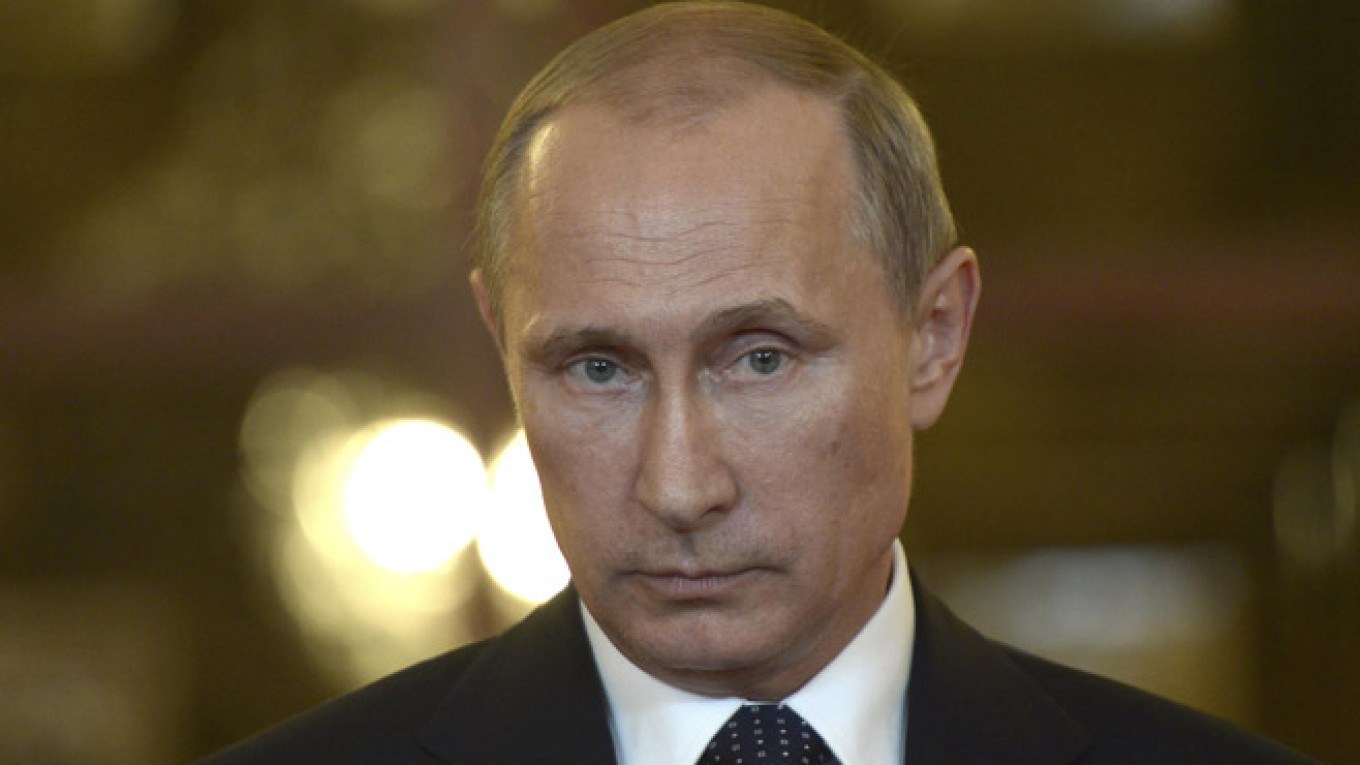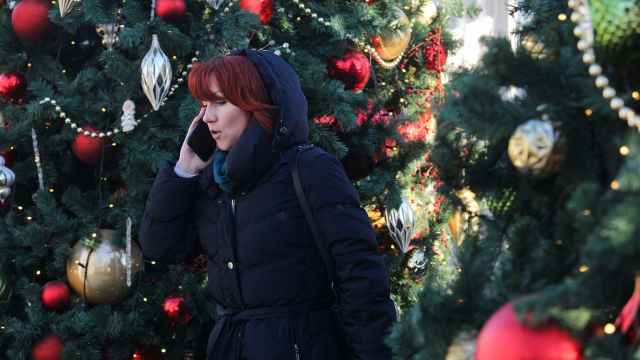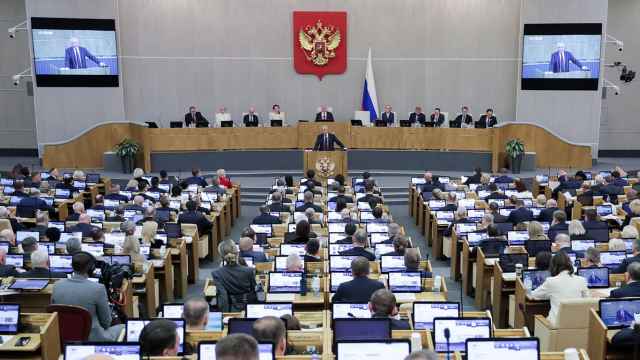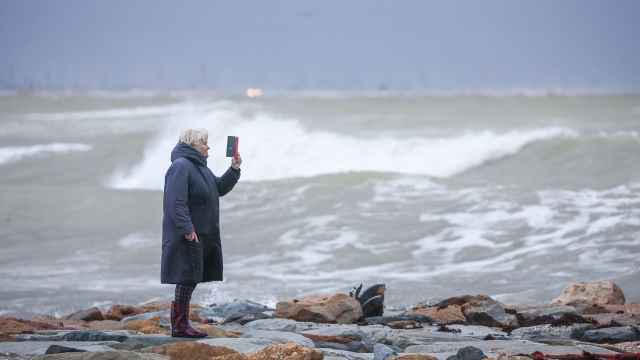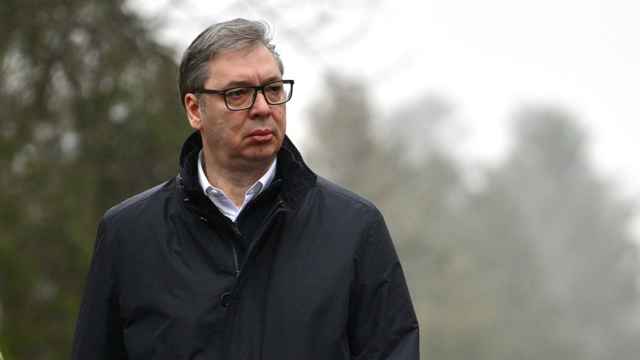The latest round of U.S. sanctions against Russia was all but inevitable and President Vladimir Putin could not have prevented them, analysts said Thursday, warning that the move would do little to bring Ukraine closer to resolving the ongoing armed conflict in the country's east.
"Russia was declared the culprit in the Ukraine crisis long ago, and sanctions would have been applied even if all insurgents had been destroyed," said Vladimir Evseyev, director of the Center for Social and Political Studies.
"Putin did not even attempt to prevent the move by the U.S.; what he was trying to do was mitigate the sanctions imposed by the European Union," he told The Moscow Times.
U.S. President Barack Obama said that in order to avoid sanctions Russia should have halted the flow of weapons and fighters into Ukraine, supported a cease-fire, urged pro-Russian insurgents to release hostages, pursued internationally mediated talks and invited monitors to the Russia-Ukraine border.
"So far, Russia has failed to take any of the steps I have mentioned. Russia's support to the separatists and violations of Ukraine's sovereignty has continued," Obama told reporters on Wednesday in the press briefing room of the White House.
While Putin did make several steps forward, such as recognizing Ukraine's presidential election in May and asking the Federation Council to revoke the right to use troops there, these were mere diplomatic gestures to "arm sanction-skeptics in the U.S. and EU with strong rhetorical arguments," said Maria Lipman of the Moscow Carnegie Center.
"Obama has threatened to impose a new round of sanctions several times, but since he backed off every time, the opposition in U.S. Congress accused him of weakness and inaction," Lipman said in a phone interview.
"The Americans wanted Russia to impose a total de-escalation of the conflict, which could only be achieved by a complete closure of the border," she said.
Speaking about sanctions at his final news conference in Brazil, the endpoint of his week-long tour across Latin and South America, Putin urged both sides of the Ukrainian conflict to stop the bloodshed and resume negotiations.
Putin called the sanctions a result of America's "aggressive and highly unprofessional foreign policy" that "is driving Russian-U.S. relations into a stalemate and seriously damaging them. I am certain that this is harmful to the U.S. administration and American people's long-term strategic national interests," he said.
According to Evseyev, the reasons for the sanctions run much deeper and go back to long before the current clash over Ukraine's future.
"The U.S. had been hoping that the Ukraine crisis would weaken Putin's domestic support base. When the opposite happened, they were lost, and decided to stay the course and apply more pressure," he said.
Lipman described the sanctions as a direct result of the current "conflict logic" between Russia and the U.S., in which "each side would rather deepen the conflict than overcome it."
Prime Minister Dmitry Medvedev, who worked with Obama during his 2008 to 2012 presidential term on trying to foster deeper U.S.-Russian ties, called the sanctions "evil."
"International experience shows that such sanctions did not bring anybody to their knees," he said at a government meeting on Thursday. "This will lead to further consolidation of Russian society against those countries and people who are trying to restrict our country and act against the interests of our citizens."
Russia's Foreign Ministry called the sanctions "revenge" by the U.S. after it realized that events in Ukraine were not developing along with "Washington's scenario."
"I think these sanctions are like a train that was pushed down from a tall hill. Russia was clearly interested in de-escalating the situation, the Defense Ministry invited OSCE monitors to the border, Putin urged a cease-fire with the insurgents, but the initial push toward confrontation was too strong," said Sergei Oznobischev, director of the Institute of Strategic Assessment, a Moscow-based think tank.
"Unfortunately, the current situation has formed the agenda for the next U.S. president and this agenda will also be confrontational. The good thing is that Russia and the U.S. are fundamentally doomed to have to cooperate with one another," he said by phone.
See also:
U.S. Defense Sanctions Toothless, but Europe's May Bite
Contact the author at [email protected]
A Message from The Moscow Times:
Dear readers,
We are facing unprecedented challenges. Russia's Prosecutor General's Office has designated The Moscow Times as an "undesirable" organization, criminalizing our work and putting our staff at risk of prosecution. This follows our earlier unjust labeling as a "foreign agent."
These actions are direct attempts to silence independent journalism in Russia. The authorities claim our work "discredits the decisions of the Russian leadership." We see things differently: we strive to provide accurate, unbiased reporting on Russia.
We, the journalists of The Moscow Times, refuse to be silenced. But to continue our work, we need your help.
Your support, no matter how small, makes a world of difference. If you can, please support us monthly starting from just $2. It's quick to set up, and every contribution makes a significant impact.
By supporting The Moscow Times, you're defending open, independent journalism in the face of repression. Thank you for standing with us.
Remind me later.


